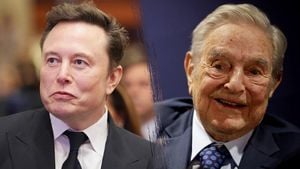Billionaire Gautam Adani, the chairman of the Adani Group and one of India's richest men, is at the center of serious criminal allegations following his indictment by U.S. prosecutors for orchestrated bribery and fraud. The charges, amounting to over $250 million, claim Adani and senior executives at his firm concealed vast sums raised through misleading claims to U.S. and international investors, simulating compliance with anti-bribery laws. This indictment, marking the second federal legal challenge against Adani Group within two years, holds massive stakes not just for Adani himself but also for India's political and economic environments.
Federal prosecutors allege Adani's ilk paid off Indian officials strategically to secure contracts worth upwards of $2 billion. These charges paint a troubling picture of how intertwined corruption may be with high-profile international business operations. According to the indictment, which spans 54 pages, Adani is accused of using bribery as part of his corporate strategies for acquiring lucrative bids.
Ever since the recent allegations became public, the impact has been palpable. The Adani Group, once valued at $169 billion, witnessed its market capitalization plummet by $34 billion almost overnight. Their companies, including Adani Green Energy, which was expected to secure significant funding through bonds, found their plans dashed, indicating broader concerns surrounding investor confidence and market stability. With shares rapidly declining, there's considerable unease about how this legal matter may ripple through India’s economy, where Adani's influence has already been certified through substantial investments across various sectors.
Adani’s business empire isn’t just large; it is integrated deeply within the Indian economy. He holds significant shares across numerous markets, operating the country's largest private energy company and controlling ports and airports as part of his sprawling infrastructure operations. It's estimated he employs over 45,000 people directly, but the consequences of these allegations could affect millions indirectly as they touch the very infrastructure underpinning India's burgeoning economy.
With his political connections, especially to Prime Minister Narendra Modi, Adani’s rise to prominence raises eyebrows among skeptics who’ve long accused him of benefitting from crony capitalism. Moody’s and other market analysts have flagged these allegations as potentially catastrophic, asserting they could severely jeopardize not just Adani’s business dealings but the broader perception of India within global financial markets.
This latest indictment follows previous serious accusations, including fraud allegations from the short-seller Hindenburg Research, which accused the conglomerate of stock manipulation over multiple years. Those earlier claims already ignited significant market fluctuations, sparking several investigations from financial regulatory bodies, including India’s SEBI.
Critics contend these recurrent scandals overshadow the progress made by Indian entrepreneurs and could stifle future investments. Following this indictment, political reactions have rapidly unfolded. Prominent opposition leader Rahul Gandhi stated, "Bribing government officials is not shocking, but the scale of funds involved is alarming. I believe this will have lasting effects on our political framework," highlighting the fear of potential upheaval.
While legal representatives for Adani assert they are working diligently to dismantle these allegations point by point, the sheer scale of the criminal accusations looms ominously. Lisa Miller, the Deputy Assistant Attorney General, explicitly stated the aims of the prosecution, underscoring their commitment to rooting out corruption on both domestic and foreign fronts.
Questions surrounding Adani’s international ventures remain pertinent. He had ambitious plans for expansion and investment, hoping to shift billions toward renewable energy and necessary infrastructure improvements across India and beyond. With these allegations hanging heavy over his head, analysts warn this could derail his ambitious projects not just locally, but on the international stage throughout Africa and the Middle East.
According to Michael Kugelman from the Wilson Center, "This indictment strikes at the core of who Gautam Adani is. His alignment with India’s growth story intertwined with Modi’s political capital makes this all the more relevant." The outcome of these charges might redefine the corporate narrative surrounding Indian entrepreneurs at large and induce international investors to rethink their strategies concerning the nation.
Despite his rich history of business successes, Adani now faces immense pressure from the international legal system, and the U.S.-India business relationship might also come under scrutiny. Investors and business leaders will be watching closely to see whether this situation escalates, particularly as they weigh the potential ramifications of these accusations against the broader cooperative ties between the U.S. and Indian markets.
Whether the Adani Group can rebound from these allegations remains to be seen. Analysts suggest recovery may take significant time, particularly as the trust of stakeholders wanes and financial channels constrict. Yet, some maintain optimism, noting Adani’s past recoveries from setbacks due to the powerful nature of his enterprises and the affinities between corporate interests and political motivations within India.
Going forward, it will be invaluable for observers to keep track of how Adani navigates this intensive scrutiny and whether his enterprise can overcome what could be termed not just personal challenges but also national milestones. The dilemma is just beginning as Gautam Adani's next moves will reverberate deeply through both the Indian economy and its political fabric. Will this legal battle spell the end of Adani's reign or merely serve as another chapter of resilience for the tycoon? Only time will tell, but for now, all eyes are on this high-stakes drama.”



